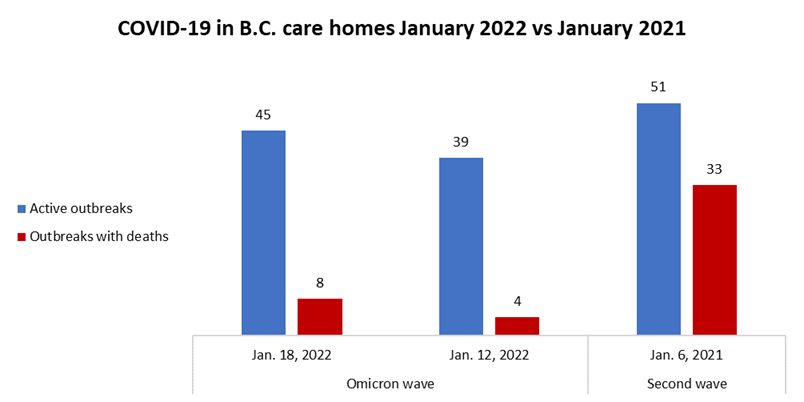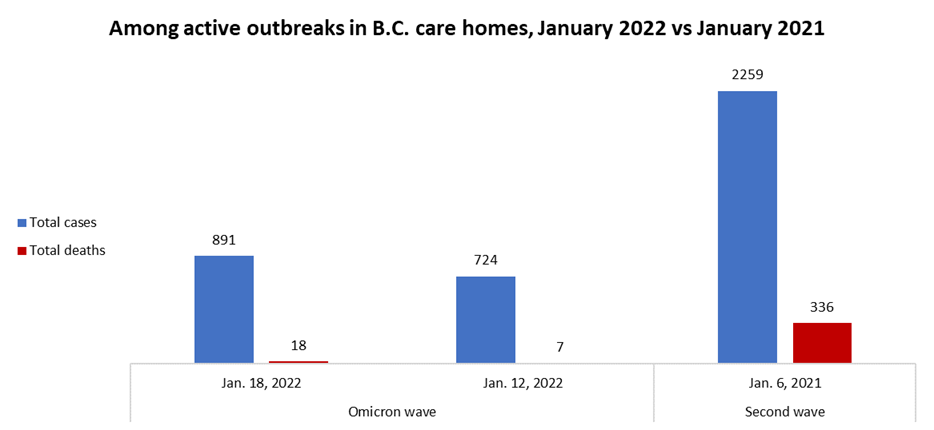Deaths associated with COVID-19 outbreaks in B.C. rising, but still far fewer than previous waves
The number of COVID-19 cases and outbreaks in B.C. care homes continues to grow during the Omicron surge, but deaths in this wave remain less common than they were during previous ones.
In the latest report on outbreaks in long-term care, assisted-living and independent-living homes from the B.C. Centre for Disease Control - which captures data as of Tuesday morning - there were 45 active outbreaks in the province.
Of those outbreaks, eight had any deaths associated with them (18 per cent of the total).
That's an increase from the previous week's report, when there were 39 active outbreaks and only four of them had resulted in deaths (10 per cent of the total number of outbreaks).
However, this week's numbers are still a far cry from what they were in January 2021, when the BCCDC reported 51 active outbreaks and 33 with deaths associated (65 per cent).
A similar pattern holds when looking at the percentage of care home cases ending in death. This week's 45 outbreaks have a total of 891 cases associated with them, and the eight that have seen at least one resident die have seen a total of 18 deaths between them.
This means that, so far, 2 per cent of infections associated with active care home outbreaks in B.C. have resulted in death.
That's an increase from last week, when a total of seven deaths were associated with 724 cases, good for a death rate of just 1 per cent.
It's still much improved from January 2021, however, when there were 2,259 infections associated with active outbreaks, and 336 people had died, a death rate of nearly 15 per cent.
 The number of active care home outbreaks in which residents have died for three specific dates, two from the Omicron wave and one from the second wave in January 2021. (Data from the BCCDC)
The number of active care home outbreaks in which residents have died for three specific dates, two from the Omicron wave and one from the second wave in January 2021. (Data from the BCCDC) Total cases and deaths associated with active outbreaks in B.C. care homes for three specific dates, two during the Omicron wave and one during the second wave in January 2021. (Data from the BCCDC)
Total cases and deaths associated with active outbreaks in B.C. care homes for three specific dates, two during the Omicron wave and one during the second wave in January 2021. (Data from the BCCDC)
Obviously, a lot has changed over the last year. In early 2021, the province was still in the process of administering first and second doses of COVID-19 vaccines in care homes. The Alpha variant of concern was just starting to appear in B.C. and had not yet become the dominant strain of the coronavirus in the province.
Today, the vast majority of care home residents have received booster doses of vaccine, and the extremely contagious Omicron variant is generally causing milder illness in those who have been immunized.
Speaking to reporters during a news conference Friday morning, provincial health officer Dr. Bonnie Henry credited high uptake of booster shots among residents and staff in long-term care with "changing the balance" of precautions that are needed in long-term care homes.
"With the increase in transmission in our communities, we've also seen increases in cases and outbreaks in long-term care and assisted living among both residents and staff," Henry said. "For family members, for people who work and operate in long-term care and for our public health team, I know this is very concerning."
"Our focus continues to be to protect our elders and seniors who we know - and we've seen the data - are more vulnerable to severe illness, but also to balance that with ensuring our seniors have the care and the support they need," she added.
Henry did not specify what changes would be made to long-term care restrictions as the province begins to manage COVID-19 more like it manages the common cold.
Unlike colds and flus, the coronavirus remains dangerous enough to warrant the public health measures B.C. currently has in place, the provincial health officer said.
Last month, Henry introduced a public health order restricting visits at long-term care homes to essential visitors only. That rule does not apply to assisted-living facilities.
CTVNews.ca Top Stories

Western University researchers unlock potential 'cure' for ALS
New research out of London, Ont.'s Western University is shedding light on a potential cure for ALS, in which the targeting of the interaction between two proteins can halt or fully reverse the disease's progression.
Police release 3D images of young child found in an Ontario river two years ago
Police have released a three-dimensional image of a young child whose remains were discovered in the Grand River in Dunnville, Ont. almost two years ago.
B.C. brings in law on name changes on day that child killer's new identity revealed
The BC NDP have tabled legislation aimed at stopping people who have committed certain heinous acts from changing their names.
Kamala Harris drops F-bomb during White House live-stream
U.S. Vice-President Kamala Harris used a profanity on Monday while offering advice to young Asian Americans, Native Hawaiians and Pacific Islanders about how to break through barriers.
B.C. man fighting for refund after finding someone living at Whistler vacation rental
Edwin Mostered spent thousands of dollars booking a vacation home in Whistler, B.C., for a group skiing trip earlier this year – or so he thought.
Avs forward Valeri Nichushkin suspended at least six months
Colorado Avalanche forward Valeri Nichushkin was suspended for at least six months without pay and placed in Stage 3 of the league's player assistance program.
Collapsed Baltimore bridge span comes down with a boom after crews set off chain of explosives
Crews conducted a controlled demolition Monday to break down the largest remaining span of the collapsed Francis Scott Key Bridge in Baltimore.
Security video caught admitted serial killer disposing of bodies in Winnipeg garbage bins
Security video caught admitted serial killer Jeremy Skibicki on multiple late-night outings, disposing of body parts in nearby garbage bins and dumpsters in the middle of the night.
Mortgage companies could intensify the next recession, U.S. officials warn
U.S. officials worry the next recession could be intensified by a cascading series of failures in the mortgage industry caused by crashing home prices, frozen financial markets and soaring delinquencies.
































